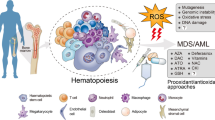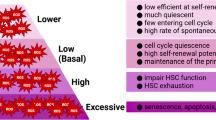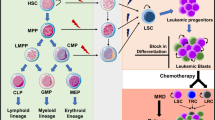Abstract
Human myeloma stem cells were detected by their capacity to form colonies in culture. Cells separated from aspirated marrow were cultured for 10 days in semi-solid methylcellulose with medium conditioned by T lymphocytes stimulated by phytohaemagglutinin (PHA-TCM). The colonies formed consisted mostly of lymphoplasmacytoid cells or plasma cells, and the immunoglobulins in the patients' myeloma cells were demonstrated also in the cytoplasm of the colony cells. The number of colonies were proportional to the number of cells plated and to the concentration of PHA-TCM. When the proportion of proliferating colony-forming units of multiple myeloma (CFU-MM) was studied using the (3H)-dT-suicide technique, the high-specific-activity (3H)-dT killed 21-45% of the CFU-MM in 7 myeloma patients. According to a single dose of Co-y-irradiation, the mean doses for impairment of regeneration (Do) were 1.00 and 1.63 Gy in 2 cases, the extrapolation numbers being 1.6 and 2.0.
Similar content being viewed by others
Rights and permissions
About this article
Cite this article
Shimizu, T., Motoji, T., Oshimi, K. et al. Proliferative state and radiosensitivity of human myeloma stem cells. Br J Cancer 45, 679–683 (1982). https://doi.org/10.1038/bjc.1982.108
Issue Date:
DOI: https://doi.org/10.1038/bjc.1982.108
- Springer Nature Limited
This article is cited by
-
Human B cell colony assays
Blut (1987)




